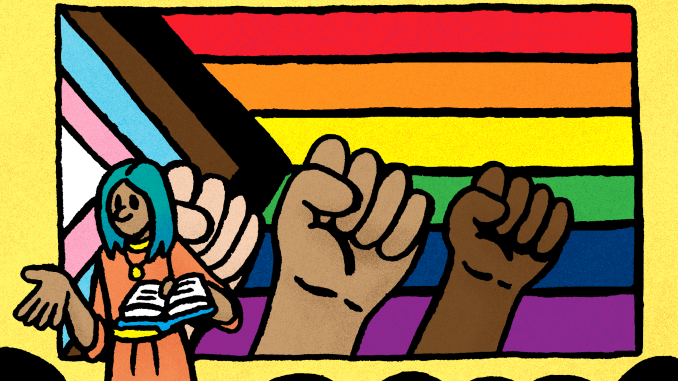
Charlie Murray was always passionate about LGBTQ issues, even before they knew that they were transgender, but the first time they learned about LGBTQ history in depth was in Fall 2020 when they took Gay and Lesbian Lives with Gino Conti at Temple University.
“I went to a Catholic high school and Lutheran grade school,” said Murray, a senior English and religion major. “LGBT stuff was either not talked about or talked about in a pretty negative light.”
This LGBT History Month, LGBTQ students are reflecting on why learning about their community’s history matters and how it helps them understand themselves. For students, knowing their history gives them a sense of freedom and liberation from other people’s expectations.
Brad Windhauser, a gender, sexuality and women’s studies professor, has been teaching Gay and Lesbian Lives, now called Queer Lives, since 2014 and covers LGBTQ history from the 1950s to the present day, he said.
The course contextualizes the lives of LGBTQ people by examining politics and pop culture from various points in time, Windhauser said.
Rodney Wilson, a Missouri high school history teacher, created LGBT History Month to celebrate important moments and people in LGBTQ history, according to GLAAD, an LGBTQ advocacy group. October was chosen for LGBT History Month to include National Coming Out Day, which is on Oct. 11.
Like Murray, Sinh Taylor had a religious upbringing and did not learn about the LGBTQ community until they came to Temple, they said. Before, the only time LGBTQ people were discussed was to reinforce the belief that being gay is a sin.
The stigma from their family and the lack of information kept Taylor from coming out until their late 20s, said Taylor, a double major in English education and gender, sexuality and women’s studies.
Taking gender, sexuality and women’s studies classes taught Taylor that it’s OK to be themself, that there is no wrong way to exist and that they didn’t have to identify as female because that’s what a doctor assigned them at birth, they added.
Logan Bennett first learned about LGBTQ history in Politics of Identity in America with Susannah Burger, a liberal arts professor, they said. Bennett signed up for the class because they struggled to understand their own LGBTQ identity as transmasculine and bisexual and wanted to understand the history behind their identity.
“As a kid, I had to seek everything out myself and when you’re on the internet there’s such a plethora of information, a lot of it can be scary,” said Bennet, a junior computer science major. “So I didn’t really have a streamlined way to learn about things.”
Politics of Identity in America explores how different identities, including LGBTQ identities, can influence politics, according to Temple’s website.
The LGBTQ course content focused on lesser-known parts of LGBTQ history, like the 1966 Compton Cafeteria riot, a conflict between transgender women and police, and LGBTQ ballroom culture, an LGBTQ subculture centered on fashion shows, Bennett said.
“It’s just so liberating to hear about the history of these people that struggled so much for me to be able to present as I do today,” Bennett said.
Since Windhauser started teaching Queer Lives, multiple students have come out as nonbinary after taking the course and told him that the class helped them better understand their identity, he said.
“That’s just cool it’s and it’s not about me doing that, it’s just exposing them to the information that’s helped them,” said Windhauser.
Mainstream narratives about transgender people push the idea that transgender people were always interested in things typically associated with their gender identity from a young age, Murray said. Learning about the different experiences of LGBTQ people helped Murray realize they do not need to fit into that narrative.
“When I was younger, I definitely liked a lot of feminine things,” Murray added. “And I still like a lot of traditionally feminine things and so it was difficult for me at times to sort of accept myself or feel like I’m not faking.”
Becoming educated about the LGBTQ community was eye-opening for Taylor and transformed their outlook on life by showing them it’s more important to be true to themself than to conform to someone else’s expectations, they said.
“You don’t have to fit into this binary box to be happy,” Taylor added.


Be the first to comment